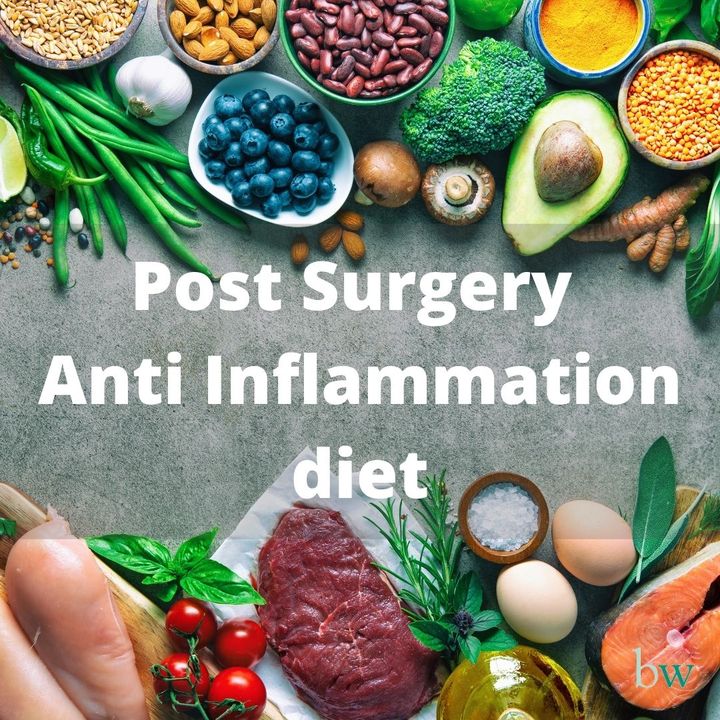In a recent newsletter I referenced this article talking about how our bodies interact with the food we eat.
A quote that jumped out at me was:
Recently recovering from a minor surgical procedure, the physician and author Siddhartha Mukherjee mused that he was able to turn to medicine for anti-inflammatories and antibiotics targeted to his recovery from the surgical wound, but there was no good information about what he should eat to assist in the healing process.
I joked that he should have asked Lisa, our Digestive Health Expert for a list.
So obviously we did just that!
Why does inflammation matter after surgery?
Inflammation is your body’s response to trauma. It makes the “unhappy” area hot and swollen to stop you moving it as much and to help fight infection.
It is a REALLY important protection system.
Except that, after surgery, it kind of gets in the way – because this is intentional trauma – we don’t want the body to be “unhappy” about it.
If the area gets swollen and hot it slows down the good stuff getting in (including the medication your doctor gave you!) and the bad stuff getting out.
So we want to help your body do it’s best job of healing and recovering as quickly as possible.
We want to:
- Increase healthy fats like linoleic acid and Omegas 3 and 6
- Reduce other fats which contribute to inflammation
- Increase micronutrients, vitamins and minerals
- Increase fibre and antioxidants
- Stabilise blood pressure and blood sugar levels
What to Eat
- Fruits: strawberries, oranges, lemons, blackberries, limes, raspberries, pears, apples, blueberries, etc.
- Vegetables: all the colours of the rainbow- tomatoes, asparagus, garlic, cucumber, broccoli, cabbage, bell peppers, Brussels sprouts, onions, ginger, etc.
- Nuts: almonds, cashews, pecans, pistachios, macadamia nuts, walnuts, Brazil nuts (best ground or soaked)
- Seeds: hemp seeds, pumpkin seeds, sunflower seeds, chia seeds, flaxseeds (best ground or soaked)
- Legumes: black beans, kidney beans, pinto beans, lima beans, chickpeas, lentils (avoid when inflamed!!)
- Whole grains: quinoa, barley, buckwheat, millet, brown rice (avoid when inflamed!!)
- Healthy fats: cold pressed extra virgin olive oil, coconut oil, MCT oil, grass-fed butter, ghee, avocado oil
- Dairy products: goat or sheep products are generally gentler on the gastrointestinal system, kefir, probiotic yogurt contain “friendly bacteria”
- Meat: grass-fed beef, lamb, venison, wild game
- Fish: wild-caught salmon, tuna, mackerel, anchovies, sardines
- Poultry: organic chicken, turkey, goose, duck
- Organic eggs
- Condiments: hummus, guacamole, apple cider vinegar, mild mustard, mild salsa, balsamic vinegar, liquid aminos acids (alternative to soy sauce)
- Herbs and spices: basil, oregano, rosemary, turmeric, cinnamon, cumin, black pepper, etc. (Not the spicy ones)
- Natural sweeteners: 100% stevia, organic/ raw honey, maple syrup, dates, coconut palm sugar
- Beverages: water, tea, kombucha, bone broth
Foods to Avoid
Just as important as filling up on the right foods is limiting your consumption of unhealthy, pro-inflammatory ingredients. These are often foods typically high in calories, sodium and added sugars.
- Refined grains: white rice, pasta, white bread, breakfast cereals
- Added sugars: (usually anything packaged) i.e. fizzy drinks, cartoned juices, sweets, cookies, granola bars, baked goods, ice cream
- Unhealthy fats: refined vegetable oils, hydrogenated fats, fried foods
- Processed/ cured meats and poultry
- Farmed fish
- Processed foods: crisps, frozen meals, microwave popcorn, processed meats, instant noodles, etc.
What Next?
If you need a more personalised plan you can book a consultation with Lisa to discuss your specific needs.
Or contact us for more information via email, WhatsApp on 699703936 or phone on 952 883 151.



Beautiful and informative post. Thankyou x
Fantastic info Emmie! This isn’t talked about enough so I am really glad to see it!!